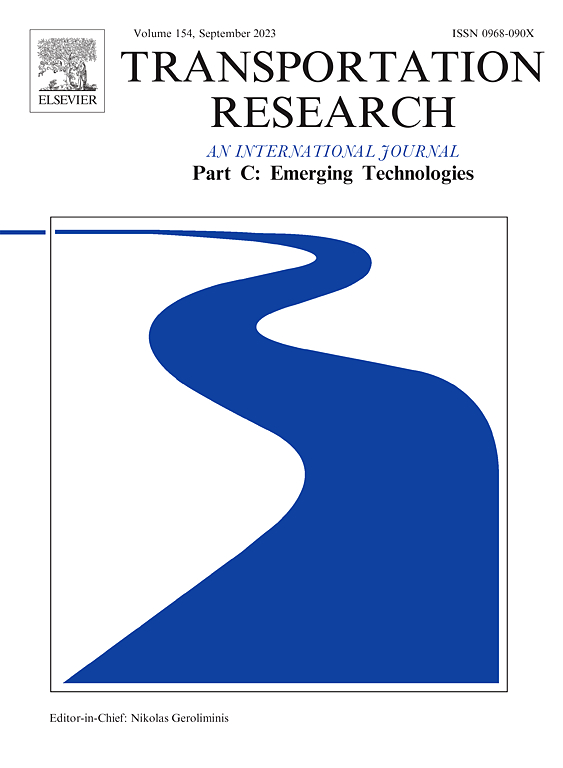实现模块化车辆运输服务的实时运营:从滚动地平线控制到基于学习的方法
IF 7.6
1区 工程技术
Q1 TRANSPORTATION SCIENCE & TECHNOLOGY
Transportation Research Part C-Emerging Technologies
Pub Date : 2024-11-22
DOI:10.1016/j.trc.2024.104938
引用次数: 0
摘要
最近的技术进步为公共交通运营期间的实时调整和控制打开了大门。特别是模块化车辆的引入,有可能显著提高公共交通服务质量。这种采用模块化车辆的创新型公共交通服务以其灵活的时间安排和车辆编组为特点,可对公交运力进行动态管理,以满足不断变化的乘客需求。本文建议在考虑不同需求的情况下,对灵活的模块化车辆公交服务进行实时调度。为了联合优化服务调度和车辆编组,我们提出了滚动地平线控制方法,将复杂问题分解为可在过程中高效解决的子问题。在此基础上,我们引入了基于学习的优化代理,以简化滚动视界框架内的优化过程,从而在不直接解决优化问题的情况下,以最短的执行时间做出接近最优的决策。通过数值研究,我们证明了所提方法在解决方案质量和效率方面的有效性和效率。此外,我们的案例研究表明,模块化车辆可以适应不断变化的需求,并有效降低公交系统的总成本。本文章由计算机程序翻译,如有差异,请以英文原文为准。
Toward real-time operations of modular-vehicle transit services: From rolling horizon control to learning-based approach
Recent technological advancements have opened doors for real-time adjustments and controls during public transport operations. In particular, the introduction of modular vehicles has the potential to significantly enhance public transit service quality. This innovative public transit service with modular vehicles, characterized by its flexible schedules and vehicle formations, allows for the dynamic management of transit capacity to meet the fluctuating passenger demands. This paper proposes to schedule the flexible modular-vehicle transit service in real time considering the varying demands. To jointly optimize the service schedule and vehicle formations, we propose the rolling horizon control approach to decompose the complex problem into subproblems that can be solved efficiently during the process. On top of this, we introduce a learning-based optimization proxy to streamline the optimization process within the rolling horizon framework, enabling near-optimal decisions to be made with minimal execution time without directly solving the optimization problem. Through numerical studies, we demonstrate the effectiveness and efficiency of the proposed methods in terms of solution quality and efficiency. Furthermore, our case studies show that modular vehicles can adapt to the changing demand and effectively reduce the total costs in the transit system.
求助全文
通过发布文献求助,成功后即可免费获取论文全文。
去求助
来源期刊
CiteScore
15.80
自引率
12.00%
发文量
332
审稿时长
64 days
期刊介绍:
Transportation Research: Part C (TR_C) is dedicated to showcasing high-quality, scholarly research that delves into the development, applications, and implications of transportation systems and emerging technologies. Our focus lies not solely on individual technologies, but rather on their broader implications for the planning, design, operation, control, maintenance, and rehabilitation of transportation systems, services, and components. In essence, the intellectual core of the journal revolves around the transportation aspect rather than the technology itself. We actively encourage the integration of quantitative methods from diverse fields such as operations research, control systems, complex networks, computer science, and artificial intelligence. Join us in exploring the intersection of transportation systems and emerging technologies to drive innovation and progress in the field.

 求助内容:
求助内容: 应助结果提醒方式:
应助结果提醒方式:


